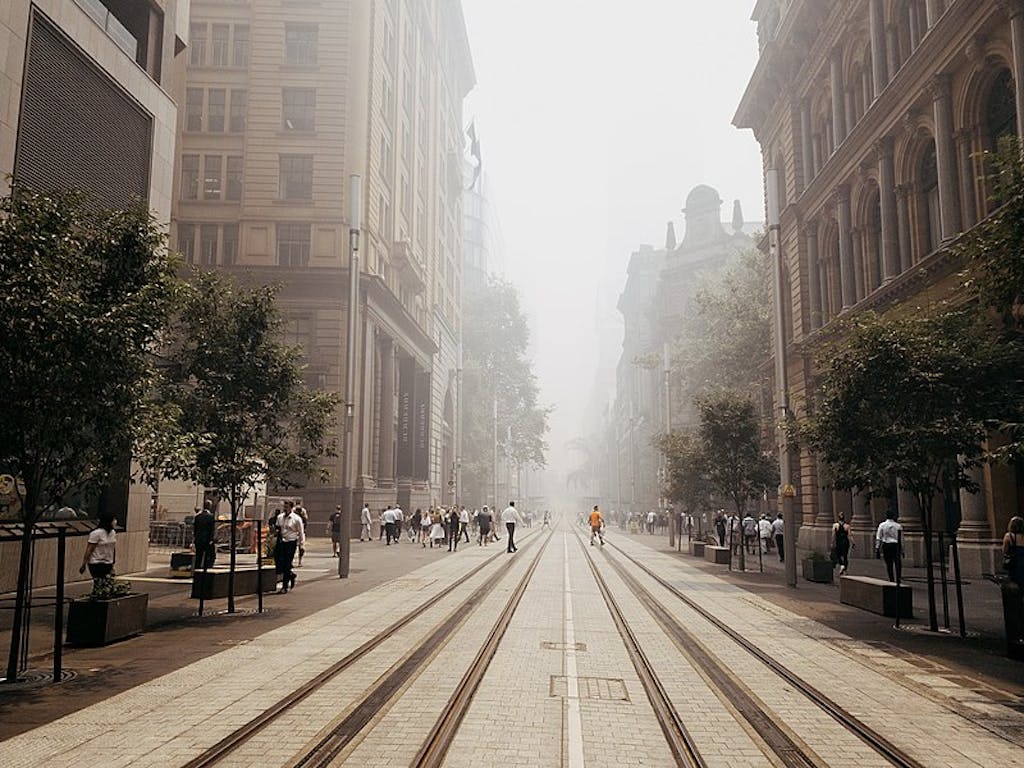Slovenian tennis player, Dalila Jakupovic, was about to serve during the first round qualifying match of the Australian Open, when she fell to her knees in a coughing fit. The air quality in Melbourne, where the tennis tournament is held, was deemed “moderate to hazardous,” because of smoke from bushfires that have burned 16 million acres in Australia — an area about the size of West Virginia. She later had to withdraw from the match, saying, “I just couldn’t breathe. I couldn’t walk so I just went down (onto the floor) because I couldn’t stand up straight.”
Dalila was one of many professional tennis players impacted by the conditions at the Australian Open — and she’s also one of the millions of people who have experienced health effects from the bushfires. In Australia’s capital, Canberra, the air quality reached the worst levels of anywhere in the world on January 2nd because of the smoke. Further, a new survey from Australian Institute found that 35% of those surveyed in New South Wales said they had suffered breathing or respiratory problems as a result.
As wildfires, like the bushfires in Australia, are projected to become more frequent and intense in a warming climate, it’s important to understand — and prepare for — the health consequences.
We interviewed Dr. María Neira, Director Department of Environment, Climate Change and Health at the World Health Organization (WHO), to learn about the connections among health, wildfires, and climate change. Dr. Neira is a medical doctor by training, whose work at WHO includes air pollution. She and her department cover a variety of health and climate intersections, from synthesizing evidence and knowledge to working with partners and identifying solutions.
Answers have been edited for clarity.
The Australian bushfires are causing massive amounts of smoke, so much that it’s drifted all the way to South America and beyond. How is the smoke affecting people’s health? And are there certain populations of people at greater risk?
Dr. María Neira: Well, we know from experience with other bushfires that the most important risk is coming from air pollution. It’s coming from those fine particles that are in the air generated by the bushfires. And then those fine particles can aggravate and contribute to chronic heart and lung diseases.
They also can be linked to increasing deaths in people who have existing chronic heart and lung conditions. What we see as well is that it increases the risk of hospitalization of people with respiratory and other conditions. And of course, if the exposure to this air pollution is for a long time, we can even see an increase in premature deaths caused by chronic respiratory and cardiovascular diseases.
Are there certain populations of people at greater risk for this kind of air pollution?
MN: Of course. The most vulnerable would be those who already have asthma conditions or chronic obstructive pulmonary diseases, or even very small children and very old people. Those are certainly the most vulnerable. But, again it will depend on the time of exposure, whether it’s an acute exposure and for how long it will be prolonged.
How do the effects of air pollution from wildfires compare to the effects of air pollution from more common sources, like vehicles or wood burning stoves?
MN: What we know is that in Australia, for instance, before the bushfires the level of air pollution was right in line with those recommended by WHO. So we were quite happy. And during the bushfires, the levels of particulate matter (PM10, a mixture of solid particles and liquid droplets found in the air) were far higher compared with the guidelines and recommendations of WHO, which is similar to the exposure when at a normal level. But again, the numbers were very high compared with the normal situation in Australia.

What other health impacts are people experiencing from the bushfires? Do we know the long-term consequences of these health impacts?
MN: I think we are still far from knowing completely the long-term exposure consequences for the health of the people. Obviously, we can anticipate mental health issues and stress-related issues. There will definitely be mental health issues, given the full picture of what this represents for the population — apart from the fact that there have been some injuries and obviously people are losing their lives.
They are losing their property and are losing their houses. That will definitely cause an impact that is difficult to evaluate but I’m sure that the national health authorities will be paying attention to that and will need to study as much as possible the impact in the immediate and long term.
How is the UN and specifically WHO working to ensure we can prevent and respond to these climate crises and their health impacts?
MN: We’re producing scientific evidence and disseminating this evidence, like the 2019 UN Climate Conference (COP25) in Madrid or at the World Economic Forum in Davos. And we’re looking for any opportunity we have to demonstrate two things: 1) That climate change is already affecting our health, and 2) The fact that if you take measures to tackle the causes of climate change, you will obtain amazingly positive health benefits. So this is our argument.
How do we do it? We disseminate information and convene groups. We do the science that is needed, like evaluating interventions that are proven to be cost effective in terms of tackling climate change, and we link the climate change and clean air agendas as much as possible.
For some politicians this is the way to go ahead as well. They don’t want to talk about climate change but they recognize the need for clean air and clean water, which is the same agenda in the end. So, we do everything we can to influence those policymakers, governments, and civil society of the importance of doing something to protect and promote our health.
We are, for instance, now attending and engaging in more energy-related events, promoting renewable energy and recognizing the source of energy that a country will select. The choices that countries make on sources of energy will be one of the most important determinants of our health. So, we need to be part of that debate and that decision-making process because it will influence our health in a very positive or very negative way, depending on the source of energy that the country will be investing in.
What are steps that governments can take to better prepare for the health impacts of climate change?
MN: I think they need to focus on the National Determined Contributions (NDCs), which are the commitments made in the Paris Agreement. Those commitments are linked to health. The sooner they start to put those commitments in place, and the more ambitious they are, the better.
We want mayors to be very much part of the commitment because mayors can be very important actors in this fight against climate change and air pollution. We’re also requesting that governments look at issues like stopping subsidies for coal or fossil fuels; additionally investing in accelerating access to sustainable sources and clean sources of energy at the household level and in general for the country.
There are many fronts in which the health sector can influence and push for obtaining better health results: energy efficiency, mode of transport they are proposing and promoting at the country level, the legislation related to people’s right to breathe the air, and more.
What can public health professionals do to better prepare for the health impacts of climate change?
MN: Public health professionals first need to be very well informed. They need to understand the connections between climate change, air pollution, and health very well. I think most of them know, but some of them are still working on the clinical part without recognizing the critical role they can play in addressing the causes of air pollution and climate change.
Second, we need to recognize that we [as public health professionals] have a role to play. We are critical actors here, and we need to raise our voice. So for me, it would be great if all doctors working on respiratory disease, cardiovascular diseases, mental health, or any public health officer would raise their voice, and put pressure on policymakers and on mayors to inform their patients. And we should also associate among the different groups of public health to make sure that we can mobilize societies and generate action by our politicians and governments.
Learn more about WHO’s work on air pollution and climate change here.




 View All Blog Posts
View All Blog Posts
